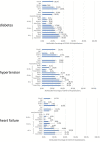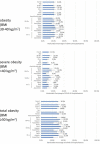Coronavirus Disease 2019 Hospitalizations Attributable to Cardiometabolic Conditions in the United States: A Comparative Risk Assessment Analysis
- PMID: 33629868
- PMCID: PMC8174244
- DOI: 10.1161/JAHA.120.019259
Coronavirus Disease 2019 Hospitalizations Attributable to Cardiometabolic Conditions in the United States: A Comparative Risk Assessment Analysis
Erratum in
-
Correction to: Coronavirus Disease 2019 Hospitalizations Attributable to Cardiometabolic Conditions in the United States: A Comparative Risk Assessment Analysis.J Am Heart Assoc. 2021 Apr 6;10(7):e020858. doi: 10.1161/JAHA.119.020858. Epub 2021 Mar 18. J Am Heart Assoc. 2021. PMID: 33733814 Free PMC article. No abstract available.
Abstract
BACKGROUND Risk of coronavirus disease 2019 (COVID-19) hospitalization is robustly linked to cardiometabolic health. We estimated the absolute and proportional COVID-19 hospitalizations in US adults attributable to 4 major US cardiometabolic conditions, separately and jointly, and by race/ethnicity, age, and sex. METHODS AND RESULTS We used the best available estimates of independent associations of cardiometabolic conditions with a risk of COVID-19 hospitalization; nationally representative data on cardiometabolic conditions from the National Health and Nutrition Examination Survey 2015 to 2018; and US COVID-19 hospitalizations stratified by age, sex, and race/ethnicity from the Centers for Disease Control and Prevention's Coronavirus Disease 2019-Associated Hospitalization Surveillance Network database and from the COVID Tracking Project to estimate the numbers and proportions of COVID-19 hospitalizations attributable to diabetes mellitus, obesity, hypertension, and heart failure. Inputs were combined in a comparative risk assessment framework, with probabilistic sensitivity analyses and 1000 Monte Carlo simulations to jointly incorporate stratum-specific uncertainties in data inputs. As of November 18, 2020, an estimated 906 849 COVID-19 hospitalizations occurred in US adults. Of these, an estimated 20.5% (95% uncertainty interval [UIs], 18.9-22.1) of COVID-19 hospitalizations were attributable to diabetes mellitus, 30.2% (UI, 28.2-32.3) to total obesity (body mass index ≥30 kg/m2), 26.2% (UI, 24.3-28.3) to hypertension, and 11.7% (UI, 9.5-14.1) to heart failure. Considered jointly, 63.5% (UI, 61.6-65.4) or 575 419 (UI, 559 072-593 412) of COVID-19 hospitalizations were attributable to these 4 conditions. Large differences were seen in proportions of cardiometabolic risk-attributable COVID-19 hospitalizations by age and race/ethnicity, with smaller differences by sex. CONCLUSIONS A substantial proportion of US COVID-19 hospitalizations appear attributable to major cardiometabolic conditions. These results can help inform public health prevention strategies to reduce COVID-19 healthcare burdens.
Keywords: COVID‐19; diabetes mellitus; heart failure; hypertension; obesity.
Conflict of interest statement
Drs Mozaffarian and Micha report receipt of grants from the National Institutes of Health during the conduct of this study. Dr Mozaffarian reports research funding from the Gates Foundation, and the Rockefeller Foundation; personal fees from The Global Organization for EPA & DHA omega‐3s (GOED), Barilla, Bunge, Indigo Agriculture, Motif FoodWorks, Amarin, Cleveland Clinic Foundation, and America's Test Kitchen (modest); and Acasti Pharma and Danone (significant); participating on scientific advisory boards of start‐up companies focused on innovations for health, including Brightseed, Calibrate, DayTwo, Elysium Health, Filtricine, Foodome, HumanCo, and Tiny Organics (significant); and chapter royalties from UpToDate (modest); all outside the submitted work. Dr Micha reports research funding from Bill & Melinda Gates Foundation, Nestle, and Danone, personal fees from Bunge, and Development Initiatives for serving as the co‐chair of the Global Nutrition Report, all outside the submitted work. The remaining authors have no disclosures to report.
Figures




Similar articles
-
Association Between Dietary Factors and Mortality From Heart Disease, Stroke, and Type 2 Diabetes in the United States.JAMA. 2017 Mar 7;317(9):912-924. doi: 10.1001/jama.2017.0947. JAMA. 2017. PMID: 28267855 Free PMC article.
-
Estimated Incidence of Coronavirus Disease 2019 (COVID-19) Illness and Hospitalization-United States, February-September 2020.Clin Infect Dis. 2021 Jun 15;72(12):e1010-e1017. doi: 10.1093/cid/ciaa1780. Clin Infect Dis. 2021. PMID: 33237993 Free PMC article.
-
Estimation of US SARS-CoV-2 Infections, Symptomatic Infections, Hospitalizations, and Deaths Using Seroprevalence Surveys.JAMA Netw Open. 2021 Jan 4;4(1):e2033706. doi: 10.1001/jamanetworkopen.2020.33706. JAMA Netw Open. 2021. PMID: 33399860 Free PMC article.
-
Predictors of arrhythmias in the population hospitalized for SARS-CoV-2.Curr Probl Cardiol. 2024 Nov;49(11):102792. doi: 10.1016/j.cpcardiol.2024.102792. Epub 2024 Aug 11. Curr Probl Cardiol. 2024. PMID: 39137880 Review.
-
Management of chronic cardiometabolic conditions and mental health during COVID-19.Prim Care Diabetes. 2021 Feb;15(1):21-23. doi: 10.1016/j.pcd.2020.08.016. Epub 2020 Sep 8. Prim Care Diabetes. 2021. PMID: 32917554 Free PMC article. Review. No abstract available.
Cited by
-
Epidemiology and risk factors related to severity of clinical manifestations of COVID-19 in outpatients: A retrospective study in Haiti.PLoS One. 2022 Sep 21;17(9):e0274760. doi: 10.1371/journal.pone.0274760. eCollection 2022. PLoS One. 2022. PMID: 36129879 Free PMC article.
-
Trends and disparities in diabetes and prediabetes among adults in the United States, 1999-2018.Public Health. 2023 Jan;214:163-170. doi: 10.1016/j.puhe.2022.10.021. Epub 2022 Dec 29. Public Health. 2023. PMID: 36586345 Free PMC article.
-
Frequency and prognosis of CVD and myocardial injury in patients presenting with suspected COVID-19 - The CoV-COR registry.Int J Cardiol Heart Vasc. 2023 Apr;45:101184. doi: 10.1016/j.ijcha.2023.101184. Epub 2023 Feb 6. Int J Cardiol Heart Vasc. 2023. PMID: 36776683 Free PMC article.
-
Trends of Myocarditis and Endocarditis Cases before, during, and after the First Complete COVID-19-Related Lockdown in 2020 in France.Biomedicines. 2022 May 25;10(6):1231. doi: 10.3390/biomedicines10061231. Biomedicines. 2022. PMID: 35740252 Free PMC article.
-
Association of cardiometabolic microRNAs with COVID-19 severity and mortality.Cardiovasc Res. 2022 Jan 29;118(2):461-474. doi: 10.1093/cvr/cvab338. Cardiovasc Res. 2022. PMID: 34755842 Free PMC article.
References
-
- Center for Systems Science and Engineering at Johns Hopkins University. COVID‐19 Dashboard. Available at: https://coronavirus.jhu.edu/map.html. Published 2020. Accessed June 13, 2020.
-
- Petrilli CM, Jones SA, Yang J, Rajagopalan H, O’Donnell L, Chernyak Y, Tobin KA, Cerfolio RJ, Francois F, Horwitz LI. Factors associated with hospital admission and critical illness among 5279 people with Coronavirus Disease 2019 in New York City: Prospective Cohort Study. BMJ. 2020;369:m1966. DOI: 10.1136/bmj.m1966. - DOI - PMC - PubMed
-
- Zhou F, Yu T, Du R, Fan G, Liu Y, Liu Z, Xiang J, Wang Y, Song B, Gu X, et al. Clinical course and risk factors for mortality of adult inpatients with COVID‐19 in Wuhan, China: a Retrospective Cohort Study. Lancet (London, England). 2020;395:1054–1062. DOI: 10.1016/S0140-6736(20)30566-3. - DOI - PMC - PubMed
-
- Docherty AB, Harrison EM, Green CA, Hardwick HE, Pius R, Norman L, Holden KA, Read JM, Dondelinger F, Carson G, et al. Features of 20 133 UK patients in hospital with covid‐19 using the ISARIC WHO Clinical Characterisation Protocol: prospective observational cohort study. BMJ. 2020;m1985. DOI: 10.1136/bmj.m1985. - DOI - PMC - PubMed
Publication types
MeSH terms
Grants and funding
LinkOut - more resources
Full Text Sources
Other Literature Sources
Medical
Research Materials

